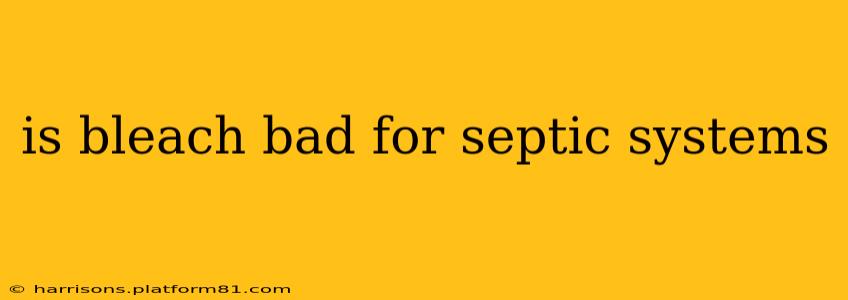Bleach, a common household cleaning agent, is a powerful disinfectant. However, its potent chemical properties can have detrimental effects on your septic system if used improperly or excessively. This article will explore the impact of bleach on septic tanks, answer frequently asked questions, and offer best practices for maintaining a healthy septic system.
How Does Bleach Affect Septic Systems?
The primary concern with bleach in septic systems is its effect on the beneficial bacteria crucial for the wastewater treatment process. These bacteria break down organic waste, converting it into less harmful byproducts. Bleach, being a powerful oxidizer, kills these bacteria, disrupting the delicate balance of the septic system. This disruption can lead to several issues, including:
- Reduced Waste Decomposition: With fewer bacteria, organic waste decomposes more slowly, leading to a buildup of solids in the tank. This can eventually cause backups and overflows.
- Increased Sludge Accumulation: The incomplete breakdown of waste results in a larger volume of sludge accumulating at the bottom of the tank, potentially shortening its lifespan.
- Septic System Failure: In severe cases, excessive bleach use can completely overwhelm the system, leading to costly repairs or even complete replacement.
What Happens if You Pour Bleach Down the Drain?
While a small amount of bleach might not cause immediate damage, repeated or excessive use can gradually harm your septic system. The harmful effects are cumulative. Think of it like this: each time you pour bleach down the drain, you're weakening the bacterial population responsible for breaking down waste. Over time, this weakening can become severe enough to compromise the entire system’s functionality.
What about diluted bleach?
Diluting bleach lessens its immediate impact, but doesn't eliminate the risk. The bacteria still suffer, even with a weaker concentration. The best approach is always to avoid introducing bleach into your septic system whenever possible.
Can I Use Bleach in My Toilet with a Septic System?
It's generally advised to avoid using bleach in toilets connected to a septic system. While the toilet flushes a relatively large volume of water, diluting the bleach, the cumulative effect of regular use remains a threat to the beneficial bacteria. Safer and equally effective alternatives exist for cleaning your toilet.
What are Safe Alternatives to Bleach for Cleaning?
Many effective cleaning alternatives are gentler on your septic system and the environment. These include:
- Baking Soda and Vinegar: This classic combination is a powerful natural cleaner and deodorizer.
- Borax: A natural mineral that’s effective against many household stains and germs.
- Commercial Septic-Safe Cleaners: Several commercially available cleaners are specifically formulated for septic systems and won't harm the beneficial bacteria.
How Often Should I Pump My Septic Tank?
Regular septic tank pumping is crucial for maintaining its health and preventing backups. The frequency depends on several factors, including household size, wastewater volume, and the tank's size. It's recommended to consult with a septic professional to determine an appropriate pumping schedule for your specific system. Regular pumping removes accumulated sludge and prevents clogs, further mitigating the negative impact of occasional bleach exposure.
What are the Signs of Septic System Problems?
Recognizing the signs of septic system issues is vital for timely intervention and prevents costly repairs down the line. Some common signs include:
- Slow Drains: A noticeable slowing of water draining from sinks, showers, or toilets.
- Gurgling Sounds: Unusual gurgling noises from drains.
- Sewage Backups: The most serious sign, indicating a significant system failure.
- Foul Odors: Persistent unpleasant smells emanating from the drain field or around the house.
In conclusion, while a small accidental spill of bleach isn't likely to cause immediate catastrophe, consistent use of bleach in a household with a septic system is strongly discouraged. Prioritize the use of septic-safe cleaning products to ensure the longevity and efficient operation of your septic system. Remember that maintaining a healthy septic system is crucial for protecting your home and the environment. Regular maintenance and informed cleaning choices are key to avoiding costly repairs and ensuring your system functions optimally for years to come.
